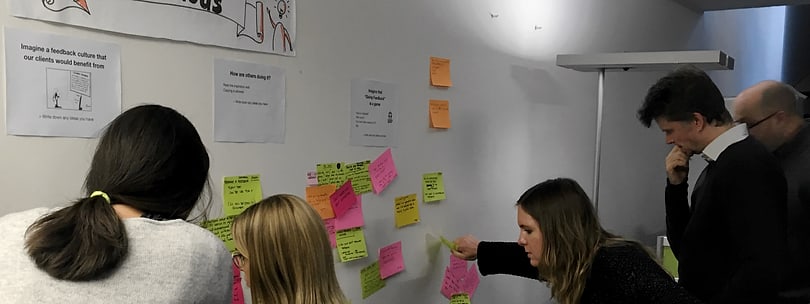We all know feedback is helpful. Employees want it and organisations depend on it so that people can grow, make progress and feel engaged. But still we resist it so often and it seems so incredibly difficult to give and take it.
That valuable but painful thing called feedback
We all know feedback is helpful. Employees want it and organisations depend on it so that people can grow, make progress and feel engaged. But still we resist it so often and it seems so incredibly difficult to give and take it.
Employees at Liip get feedback from their peers once a year and have time to discuss the results and their goals. Many of them wish for more regular feedback to make progress in a faster pace. They miss both critique and compliments alike.
At the same time they told me, they find it difficult to give meaningful feedback, to find the right words and that they fear to hurt others with critique. For most of us, feedback is awkward, uncomfortable and sometimes painful.
What if we took more time to develop others and work on our own goals?
A small team (Christian Stocker, Christina Henkel and me) started to change the feedback culture at Liip. Our motivation is that Liipers take more time to encourage and support each other to make progress. Professionally but also personally. That they take more time to work on their own goals. We hope for more motivation and pride, better quality and less fuck ups.
We asked for pioneers in a pilot project
We drafted a pilot and asked in the whole company for pioneers who are willing to spend 30min per week giving and getting feedback. We asked them to work on the following topics for the next 3-4 month.
Find a way to take time
Most of us have busy days. Client work has usually higher priority. It is difficult to take time to work on own goals and develop others.
We suggested to specifically plan time in your calendar to give feedback to others. First thing in the morning, before all the other tasks hit you.
To work on your own goals, find a mentor in the company. Somebody who discusses the topic with you, challenges you and just offers her perspective.
Get better in giving and accepting feedback
Feedback is a skill and most of us probably lack know how and experience. To gain more knowledge we offered some video and reading material (Clean feedback, Radical candor, Practical guide to employee feedback).
In addition we organised the external coach Marion Walz to give an introduction about how to give feedback and deal with challenges that come with it.
Do we need additional infrastructure?
Leapsome is a tool that lets people give and request feedback from other employees all over the company. It lets people define goals and view their progress.
We test Leapsome in our pilot to understand if we need additional infrastructure or if we can go with what we have.
Is it worth to invest more time into feedback culture?
To understand if the pilot is of any value for the participants, we collect their feedback regularly and ask them about the progress they make. At the end of the pilot we will decide if we continue investing time. The tough question will be, what exactly we could do in the future, to improve feedback culture even further. During the pilot, we will develop and test prototypes (this could be a digital solution on screen, a service or even a physical space or a product) to understand what works best for our participants and employees.
It was a already a long way until here
Before we came up with this pilot, we went through different rounds of collecting ideas and sketching solutions (thanks for the great work Marlene Stroj-Rullo, as well as help and support from Laurent Prodon and Thomas Riotte). Not everything worked as we planned and imagined. Some of the prototypes did not come to life, others had only little impact. Very often complexity hit us and left us disencouraged. It helped me to ask “what is the smallest step we can take towards our goal?” instead of solving the whole problem at once.
I also learned to evaluate ideas more carefully. In the early projects I often picked ideas that seemed most promising quite quickly. Today I sketch them out more carefully, ask for feedback from different people or do small experiments. Only then do I decide where to invest more time.

This is the first workshop we organised to collect ideas about feedback
The outcome is uncertain
If this pilot will be successful, we don’t know yet. We have a lot of volunteers and progress is visible. Taking time is difficult and often has low priority in the many tasks of daily work life. We definitely have a long way to go until we live a culture of regular feedback.